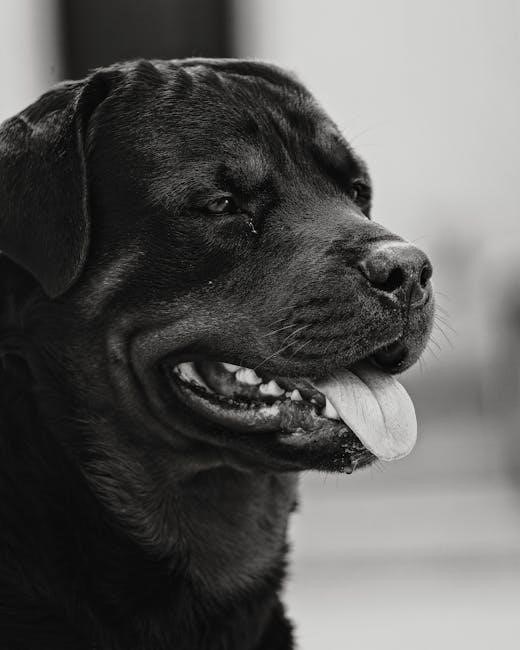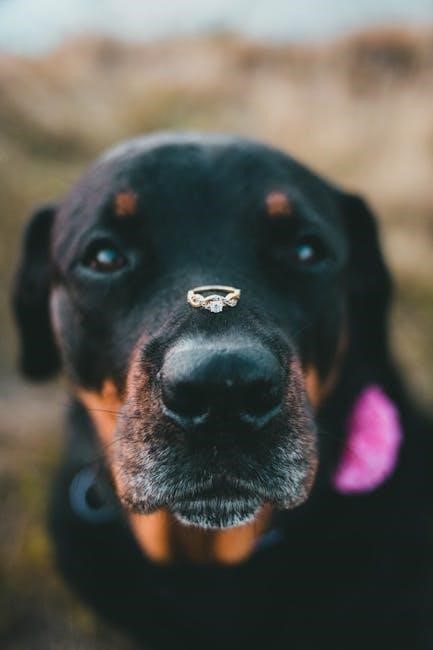Feeding a Rottweiler puppy requires careful planning to meet their nutritional needs for healthy growth. Proper feeding ensures strength, vitality, and a long, healthy lifespan.

Key Considerations for Rottweiler Puppy Nutrition
A balanced diet is crucial for Rottweiler puppies, ensuring proper growth and development. High-quality protein, adequate fats, and essential vitamins are vital for their energy and health needs.
2.1. Breed-Specific Nutritional Needs
Rottweiler puppies have unique nutritional requirements due to their rapid growth and large breed status. They need a diet rich in high-quality protein from animal sources to support muscle development, with balanced calcium levels to ensure proper joint health; Fats are essential for energy and coat health, while vitamins and minerals like glucosamine and chondroitin support joint development. Avoiding excessive protein or calcium is crucial to prevent skeletal issues. Monitoring portion sizes and ensuring a balanced diet tailored to their breed-specific needs is vital for healthy growth and preventing obesity or joint problems later in life.
2.2. Importance of High-Quality Protein Sources
High-quality protein is crucial for Rottweiler puppies, as it supports muscle growth and overall development. Animal-based sources like chicken, beef, or fish are ideal, providing essential amino acids. Avoid low-quality fillers or by-products, as they may not meet the puppy’s nutritional needs. Protein helps build strong tissues and supports energy levels. Ensuring your puppy gets a balanced diet with adequate protein ensures proper growth and prevents deficiencies, making it a cornerstone of their feeding plan for optimal health and strength.
2.3. Role of Fat and Carbohydrates in Puppy Development
Fat and carbohydrates are vital for Rottweiler puppy development, providing essential energy and supporting growth. Fats, particularly from animal sources, aid in brain development and coat health, while carbohydrates offer sustained energy. Balanced levels of these nutrients ensure proper growth without overloading the puppy. Avoid excessive carbohydrates to prevent obesity. A well-rounded diet with moderate fat and complex carbs supports overall health, ensuring your Rottweiler puppy thrives and develops into a strong, active adult.

Feeding Schedule for Rottweiler Puppies by Age
A Rottweiler puppy’s feeding schedule evolves with age, starting with frequent, small meals for young pups and transitioning to fewer, larger portions as they grow.
3.1. 0-8 Weeks: Nursing and Initial Feeding
During the first 0-8 weeks, Rottweiler puppies rely on their mother’s milk for essential nutrients and antibodies. Nursing is crucial for their immune system and growth. Monitor weight daily to ensure proper development. At 3-4 weeks, introduce a high-quality, nutrient-rich puppy food mixed with water or milk replacer, gradually increasing solid food portions. Avoid overfeeding to prevent health issues. Consult a veterinarian for tailored advice to support healthy growth during this critical period.
3.2. 8-16 Weeks: Transition to Solid Food
Between 8-16 weeks, Rottweiler puppies transition from nursing to solid food. Offer 3-4 meals daily to support rapid growth. Use a high-quality puppy food formulated for large breeds, ensuring it contains essential proteins and nutrients. Mix with water or a small amount of milk replacer to ease digestion. Monitor food intake to prevent overfeeding, and gradually increase portion sizes as the puppy grows. Stick to a consistent feeding schedule to establish good eating habits and maintain a healthy weight. Avoid adult dog food during this stage to ensure proper development.
3.3. 4-6 Months: Establishing a Regular Feeding Routine
At 4-6 months, Rottweiler puppies benefit from 2-3 balanced meals daily. Use high-quality, large-breed puppy food rich in protein and fat for energy. Portion sizes should align with growth, ensuring not to overfeed. Monitor weight to prevent obesity. Avoid adult dog food or table scraps. Stick to a consistent schedule, adjusting portions as needed. Transition to twice daily feeding at 6 months. Always consult a vet for personalized advice to ensure optimal development during this critical growth phase.
3.4. 6-12 Months: Gradual Switch to Adult Diet
Between 6-12 months, Rottweiler puppies can transition to adult food. Start by mixing puppy and adult formulas gradually over weeks to prevent digestive upset. Reduce feeding frequency to twice daily. Ensure the adult diet is nutrient-rich, with balanced protein and fat for sustained energy. Monitor weight to avoid overfeeding, as Rottweilers prone to obesity. Consult a vet for portion sizes tailored to your puppy’s growth and activity level. This phase ensures a smooth shift to adult nutrition, supporting long-term health and joint stability.
Nutritional Requirements for Optimal Growth
A balanced diet rich in high-quality protein, healthy fats, and essential vitamins ensures proper development. Key nutrients include calcium for bone growth and minerals for overall health.
4.1. Protein Content for Muscle Development
High-quality protein is essential for Rottweiler puppies, supporting muscle growth and tissue repair. Sources like chicken, beef, and lamb provide amino acids crucial for development. Aim for 22-28% protein on a dry matter basis to ensure robust muscle structure and energy levels. Protein-rich diets help prevent growth issues and promote a strong, healthy frame. Always choose puppy-specific formulas meeting these standards to support optimal muscle development and overall health.
4.2. Fat Intake for Energy and Coat Health
Fat is a vital energy source for Rottweiler puppies, supporting their active lifestyle and coat health. A diet containing 12-15% fat ensures optimal energy levels and promotes a shiny, healthy coat. Essential fatty acids, particularly omega-3 and omega-6, are crucial for skin health and reducing inflammation. Include sources like fish oil or flaxseed in their diet to enhance coat condition and overall vitality. Proper fat intake aids in nutrient absorption, ensuring your puppy thrives during growth stages.
4.3. Essential Vitamins and Minerals
Essential vitamins and minerals are crucial for a Rottweiler puppy’s growth and development. Calcium and phosphorus are vital for strong bones and teeth, while vitamin D supports absorption. Vitamin A promotes healthy vision and immune function, and vitamin E protects against oxidative stress. Zinc and iron are key for immune health and red blood cell production. Ensuring a balanced intake of these nutrients through high-quality puppy food or supplements, as recommended by a veterinarian, guarantees optimal health and prevents deficiencies that could hinder growth and well-being.

Feeding Methods and Recommendations
For Rottweiler puppies, feeding methods include wet or dry food, each with pros and cons. Follow a schedule, monitor portions, and consult a vet for personalized advice.
5.1. Wet vs. Dry Food: Pros and Cons
Wet food offers high moisture content, aiding digestion and hydration, while dry food supports dental health by reducing tartar buildup. Wet food is often more palatable but can be pricier and perishable. Dry food is cost-effective and convenient but may lack the appeal of wet food. Balancing both can provide variety and nutritional benefits. Consult a vet to determine the best option for your Rottweiler puppy, ensuring their dietary needs are met for optimal growth and health.
5.2. Portion Control and Avoiding Overfeeding
Portion control is crucial to prevent obesity in Rottweiler puppies. Follow the manufacturer’s guidelines based on age and weight, adjusting as needed to maintain a healthy growth rate. Divide meals into 3-4 portions to avoid overwhelming their digestive system. Monitor weight and adjust portions to ensure they’re not overfed. Regular vet check-ups can help track growth and prevent overfeeding issues, ensuring your puppy stays healthy and thrives throughout their development.
Monitoring Growth and Adjusting Diet
Regularly monitor your Rottweiler puppy’s weight and growth to ensure a balanced diet. Adjust portions based on developmental milestones and consult a vet for personalized advice.
6.1. Signs of Healthy Growth in Puppies
A healthy Rottweiler puppy exhibits steady weight gain, a shiny coat, and high energy levels. Proper growth is marked by firm, well-developed muscles and straight bone structure. A well-fed puppy should have a rounded belly but not appear overly fat. Monitoring these signs ensures optimal development and helps identify potential issues early. Regular veterinary check-ups are crucial to confirm healthy growth and adjust the diet as needed for the best outcomes.
6.2. When and How to Adjust Feeding Portions
Adjust feeding portions based on your puppy’s growth rate and activity level. If your Rottweiler is gaining weight too quickly, reduce portion sizes. Conversely, increase food if they appear underweight. Monitor appetite and energy levels; a loss of interest in meals may signal overfeeding. Gradually transition to fewer meals as your puppy matures, ensuring a smooth adjustment. Always consult a veterinarian before making significant changes to prevent growth imbalances. Tailoring portions to your puppy’s individual needs ensures a healthy, balanced diet.

Common Health Issues and Dietary Solutions
Rottweiler puppies may face obesity and joint issues. A balanced diet with high protein, low carbs, and joint supplements can help prevent these conditions and promote overall health.
7.1. Managing Obesity in Rottweiler Puppies
Obesity in Rottweiler puppies can lead to serious health issues, including joint problems and heart conditions. Monitoring your puppy’s weight and adjusting food portions is crucial. High-quality, nutrient-rich food with controlled calorie intake helps prevent overfeeding. Avoid excessive treats and ensure regular exercise to maintain a healthy weight. Feeding schedules should be tailored to your puppy’s activity level and growth rate. Consulting a veterinarian for personalized dietary plans can significantly reduce the risk of obesity and promote long-term health.
7.2. Addressing Joint Health Through Diet
Rottweiler puppies are prone to joint issues like hip dysplasia, making dietary support crucial. Feeding a balanced diet rich in glucosamine and chondroitin helps strengthen joints. High-quality puppy food formulated for large breeds often includes these supplements. Maintaining a healthy weight through portion control reduces strain on joints. Ensure your puppy’s diet is nutrient-dense and avoid over-supplementation. Regular veterinary check-ups can help monitor joint health and prevent future problems. A well-planned diet contributes significantly to long-term joint stability and overall mobility in Rottweilers.
Feeding a Rottweiler puppy is a critical responsibility that shapes their health and longevity. Ensure a balanced diet with high-quality protein, proper fats, and essential nutrients. Monitor growth, consult a veterinarian, and avoid overfeeding to prevent obesity. Consistency in feeding schedules and portion control is key. By following these guidelines, you’ll raise a strong, healthy Rottweiler. Always prioritize your puppy’s unique needs and adjust their diet as they grow. A well-fed Rottweiler puppy will thrive and become a robust, loyal companion.